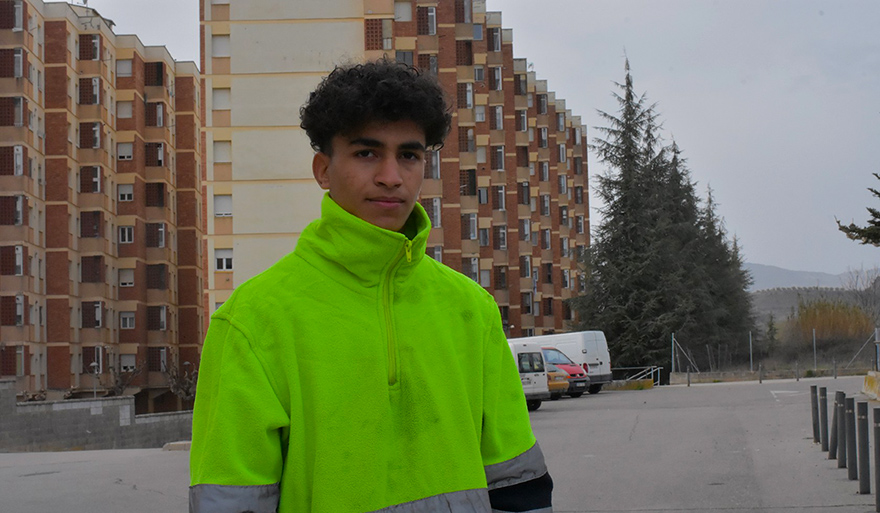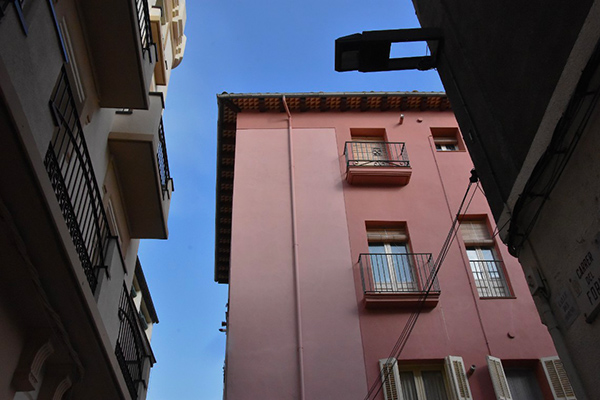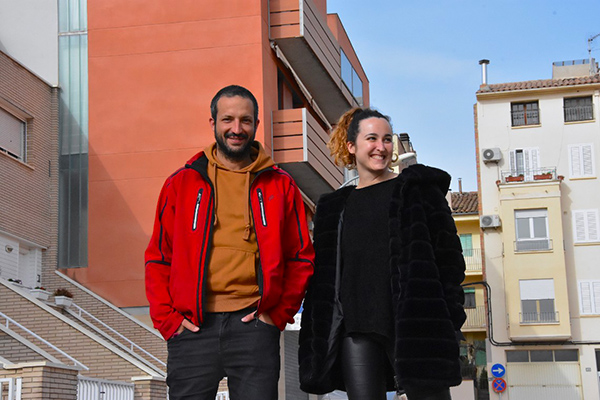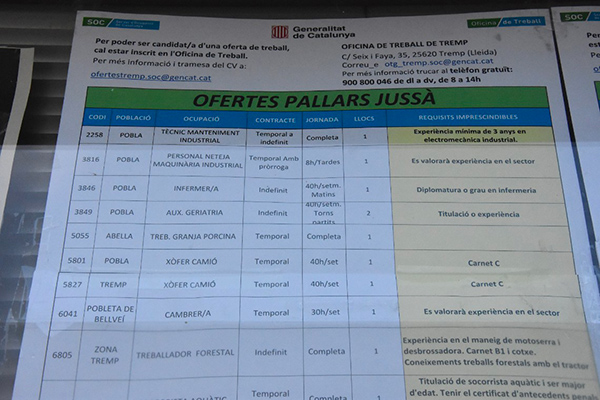The young migrants brought in to save a rural community from depopulation
The Avenir project provides housing and training for young migrants in an ageing area of the Catalan Pyrenees, helping them to find work and regenerate the area.

Tremp (Spain)
Smail wakes up early each morning. At eight o’clock each morning, he goes to the recycling centre, where he attends to those wanting to recycle their waste. He then sorts through the recycling and cleans it until he goes home at two. Sometimes, in the afternoon, he delivers food and newspapers around homes in his town. He is nineteen years old and Moroccan, but he lives in Tremp, a town of 6,000 inhabitants in North-East Catalonia, bordering the Pyrenees.
He arrived here in 2020 with nine other young, unaccompanied migrants. They were the first participants in the Avenir project, an initiative that gave them training and housing in an area riven by depopulation. The objective is twofold: the migrants are helped to build a dignified future for themselves and the town gets young people prepared to work there.
“It is rural areas that are bearing the brunt of a young population that does not want to stay there”, explains Violeta Quiroga, a lecturer in Social Work at the University of Barcelona, which has participated in the scheme. This means that we end up with concentrated elderly and inactive populations. In trying to address the issue, as well as confronting their responsibility to look after young, unaccompanied immigrants, the Generalitat de Catalunya and the Occitan Chamber of Commerce created the scheme using €700,000 from the European Union’s FEDER fund.
Participants leave young migrant detention centres to move to the mountainous region. There, they are moved into a house in which seven professionals are with them twenty-four hours a day to help them with daily tasks. “The objective is for them to find a job and then they can leave, though all of them with work experience to help them in the future”, says the director of the programme, Mireia Badia. Amongst the skills gained at work, they also learn how to cook a balanced diet, look after their own money and wash their clothes.

At the same time, the project provides them with training that can be developed in the local area. As there are few educational opportunities in the area and any institutions do not tend to permit those without correct papers, Avenir organises courses catered towards the interests of its participants, with apprenticeships in local businesses. Participants have received training in carpentry, hairdressing, building and maintenance… “I liked the mechanics course the most”, says Smail. The scheme also helped him to obtain a driver’s licence, crucial in an area with little public transport.
The priority: to find work
Of the first ten participants, eight are currently in work. “For them, the priority is to find a job, get work papers and save up money to send back to their families in Morocco”, explains Mireia Badia. Another of these youngsters who is already in work is Mahjoub, employed by the council of La Pobla de Segur, a town of 3,000 inhabitants near Tremp. Its mayor, Marc Baró, describes Mahjoub as an industrious young man: “I have never heard him say ‘no’ to anything, all of his co-workers love him”. He works in cleaning, gardening, bricklaying and other areas. His arrival in the town has been a success, confirms Baró: “They come to earn a living, not to sit in a bar”.
One of the teachers, Xavi Sánchez, raises the point that the participants have suffered some racist abuse. “They carry a certain stigma with them and there has been a little blowback from locals, the kind of racism that is normalised”, he says. They get dirty looks when speaking Arabic in shops, or unfounded accusations of shoplifting from supermarkets. He believes, however, that the project can “disprove all the stereotypes”, because, as the local population gets to know the boys, they will leave their prejudices behind: “This kind of cultural exchange enriches communities”. Violeta Quiroga agrees: “People become more respectful of those from other countries”.

On top of housing and training, Avenir also helps its participants to enjoy their free time. “Social ties help to root someone in the community”, Quiroga points out, and this is why the scheme helps them to participate in sporting activities and in volunteering in local clubs and associations. Smail goes out to play football with friends when he can. “I’m a Madrid fan”, he explains to his horrified Barça-supporting coach. Xavi Sánchez agrees that “sport can provide a backbone” to integration for the participants, who already have a group of friends. “Life is not only working and studying”, he remarks.
Becoming independent is not easy
Although all those entering the programme do so with the objective of finding work, getting there can be a bittersweet moment. Once they get a job, they are given six months to get out of the flat. Mireia Badia says that, of the ten initial participants, “three found work very quickly, almost as soon as they arrived, and they were terrified of leaving the scheme so soon”. Faced with the problem of housing scarcity in the region, the institutions decided to help them into transitional housing which meant that they could “work on the things they were missing to cement themselves in society”. Two of them have now left the scheme completely. Smail is planning on leaving Avenir before the summer, though he has a plan: “I am going to rent with some friends in Tremp”.
Another difficulty often facing the migrants is documentation. When arriving in Spain in unusual circumstances, immigration policy puts many barriers in the way to accessing a job and training. The programme’s leaders talk of a constant struggle against bureaucracy: it is almost impossible for businesses to jump through all the required hoops when it comes to hiring someone looking for a work permit.
The director of the Tremp Employment Office, Joan Sarrias, one of the project’s coordinators, laments the inflexibility of immigration law, which makes compliance particularly difficult in rural areas. Despite these obstacles, he claims that Avenir “has been a complete success”. Mireia Badia agrees: “The boys arrive very vulnerable and now they have grown and have great prospects for the future”.

The initiative comes to an end in May, two years after it began. The project was a pilot and, although its leaders hope that it will continue, they do not know whether the format will be the same nor, above all, whether they will have the same resources from European funding. “We will miss the funding”, says Badia. Joan Sarrias claims that Avenir has clearly shown the need for an adequate work offer in rural areas, proposing a “small trade school” that welcomes students from any background and one that will be “sustainable in the future”.
Meanwhile, Tremp and the surrounding area have already gained more than ten working young men, a considerable number in such a small town, according to Sarrias: “14 people here can change population, unemployment, and age statistics”. Almost all the participants have stayed in the area for now. Smail finds it familiar: his birthplace, in the centre of Morocco, is a small town similar to Tremp. It is also small, mountainous and climatically similar. With his reflective yellow uniform from the recycling centre, he makes his plans clear: “I’ll stay here for another fives years”.
 This article was produced as part of the Union Is Strength competition, organised by Slate.fr with the financial support of the European Union. The article reflects the views of the author and the European Commission cannot be held responsible for its content or use.
This article was produced as part of the Union Is Strength competition, organised by Slate.fr with the financial support of the European Union. The article reflects the views of the author and the European Commission cannot be held responsible for its content or use.